
Every child has the fundamental right to a democratic education. Democracy is the first part of our nation. The Right to Education or RTE was established to provide equal learning opportunities to students.
The primary goal of the RTE Act is to guarantee that all children, especially disadvantaged students who are unable to complete their studies or compelled to drop out of school, will receive high-quality elementary education regardless of their financial situation or caste.
Democratization of education is a system in which students of every background is accessible to equitable and inclusive education irrespective of socioeconomic and cultural background.
It is very essential for schools and educational institutes to promote and support democratic education in order to achieve a 100% literacy rate.
Contents
What is Democratization of Education?
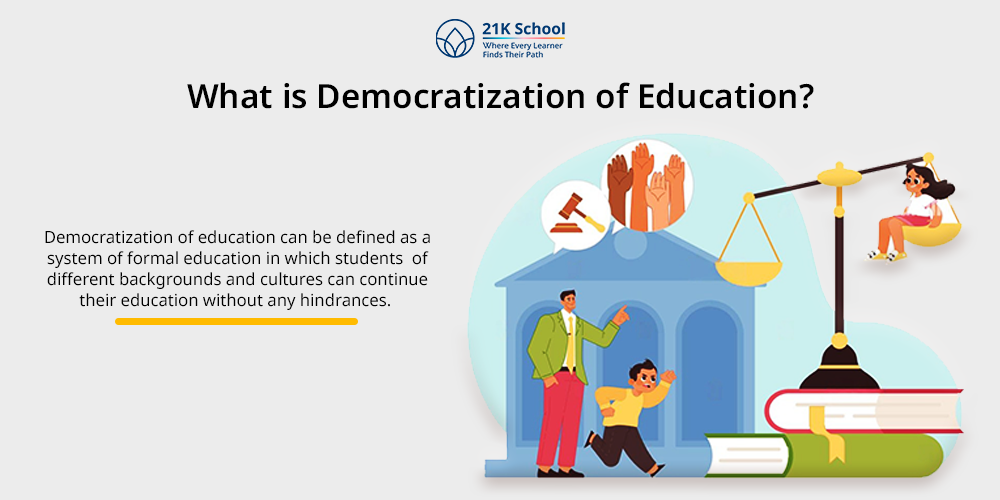
Democratization of education can be defined as a system of formal education in which students of different backgrounds and cultures can continue their education without any hindrances.
Democracy is the right of every individual and provides freedom, the same way democratization of education is also an equal right for every student. This allows them to become more well-informed citizens of the society.
Through the democratization of education students who are socially and economically weak can also pursue their education without any hindrances.
The government and teachers are also doing their best in order to promote equal learning opportunities that create a democratization of education.
Key Principles of Educational Democratization
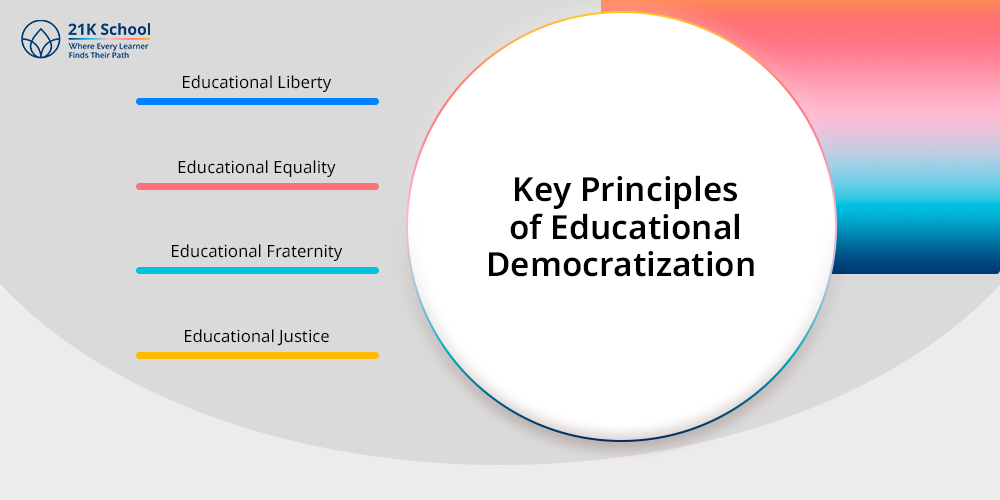
The main aim of educational democratization is it make education equal and more effective for every student.
Equal education focuses on the cognitive development of kids as well as acting as critical thinking activities for kids.
Democracy has four pillars, Liberty, Equality, Fraternity and Justice. For the same in educational contexts, the same principles apply to educational democratization.
Below you can check the principles of educational democratization.
1. Educational Liberty:
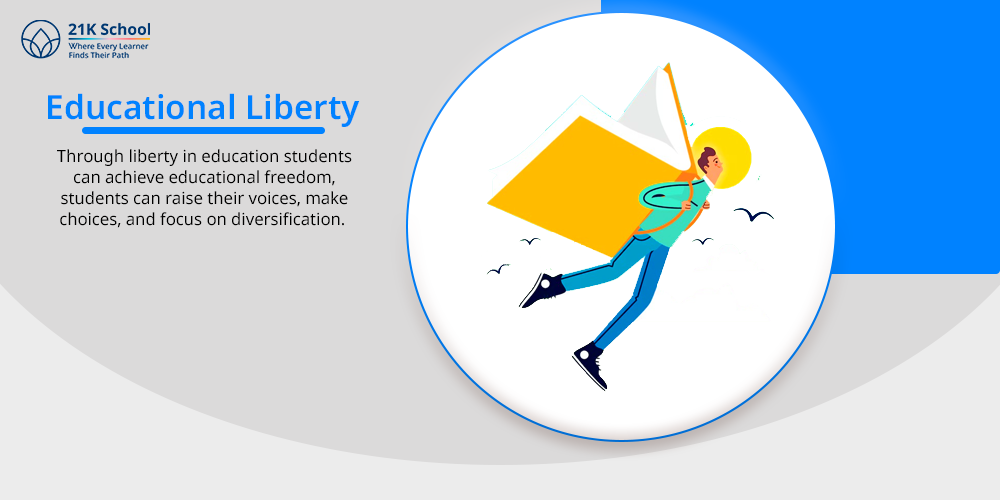
Liberty in education is the freedom of an individual to think, express and opinions.
Through liberty in education students can achieve educational freedom, students can raise their voices, make choices, and focus on diversification.
This helps in fostering creativity and critical thinking skills. In order to prepare for democratic citizenship it is essential for students to learn how to think as well as what to think.
2. Educational Equality:
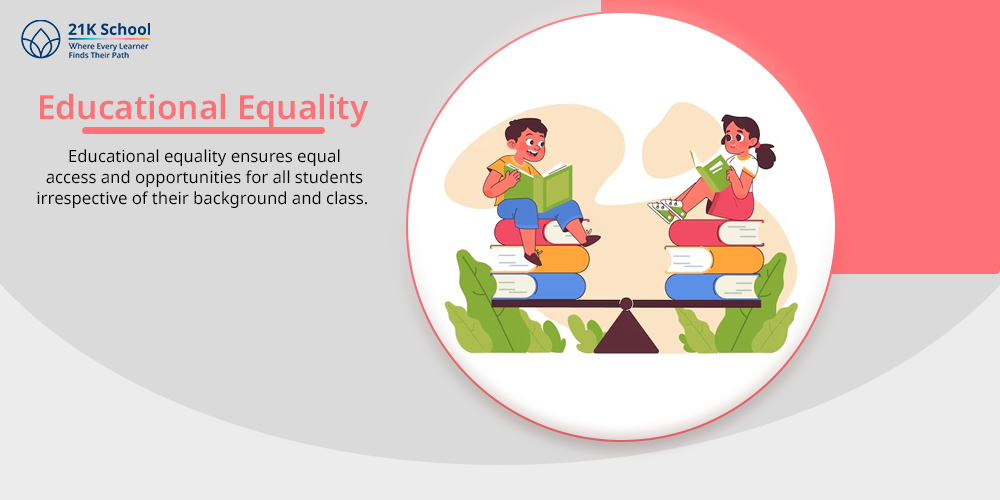
Educational equality ensures equal access and opportunities for all students irrespective of their background and class.
Equality in education consists of equal access, equal resources, equal treatment, and equal learning. This allows every kid to enhance their knowledge and skills.
3. Educational Fraternity:
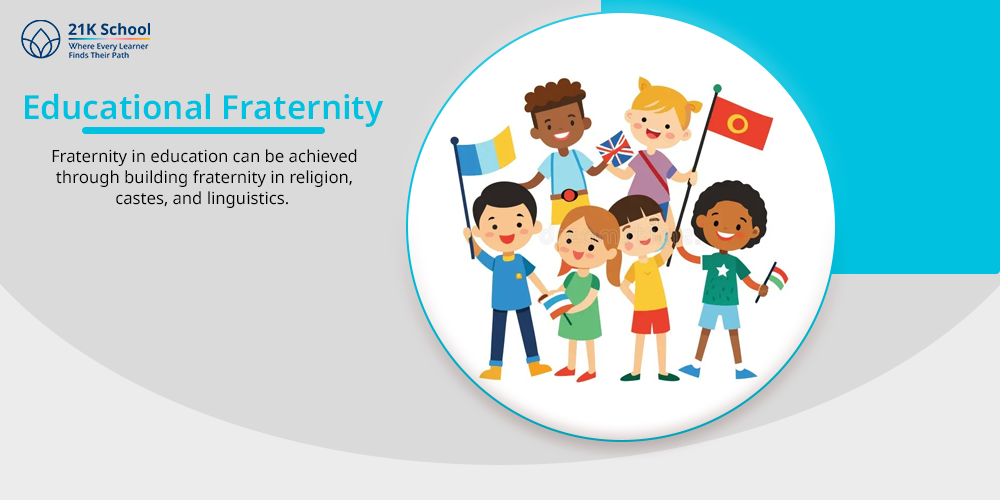
Educational fraternity is the ability of students to develop a sense of mutual understanding and community among students.
Fraternity in education can be achieved through building fraternity in religion, castes, and linguistics.
Schools can use fraternity to combat prejudice and equip students to be citizens in a multicultural society, through a collaborative environment.
4. Educational Justice:
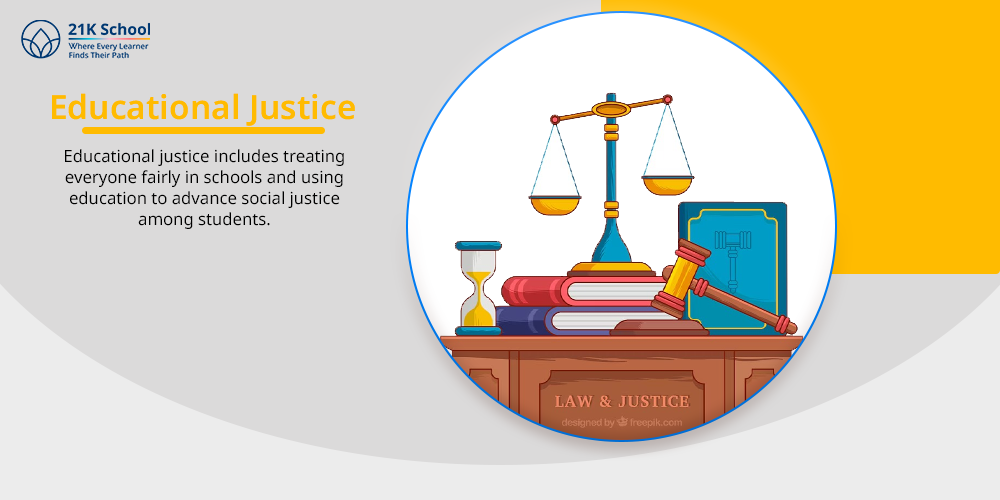
Educational justice includes treating everyone fairly in schools and using education to advance social justice among students.
These principles include fair policies, discipline, curriculum, and so on. Justice in education also promotes fair and equal learning through every aspect of education.
Role of Technology in Democratization of Education
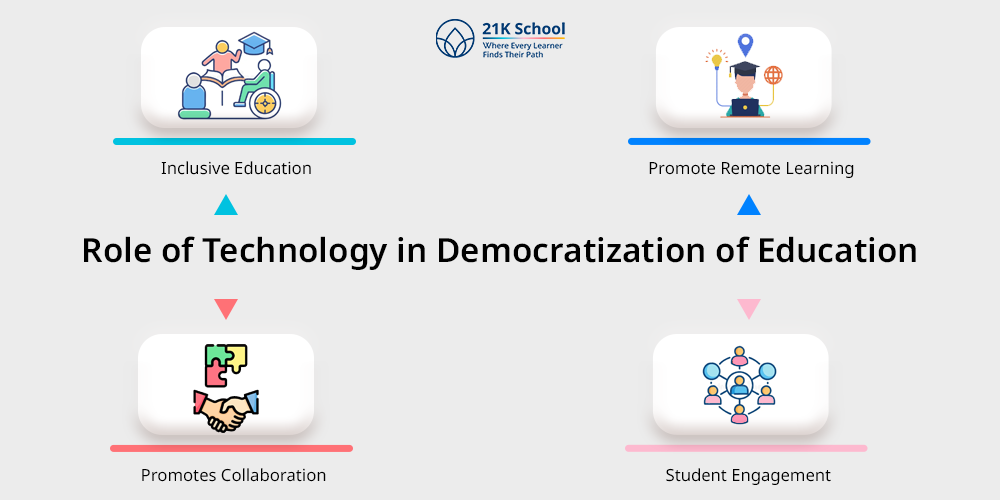
Technology plays an integral role in the democratization of education. Through technology, inclusive education can be implemented.
Technology helps in bridging the gap of equal education by democratizing equal learning opportunities. Below you can check how technology helps in the democratization of education.
- Inclusive Education: Technology helps in promoting inclusive education through equal opportunities. Through technology, students can access equal education irrespective of any challenges.
Physical mobility and obstacles are eliminated by virtual learning. Digital platforms can be used to meet the needs of individuals. - Promote Remote Learning: Technology helps in implementing remote learning. Through the democratization of technology, kids can access equal learning opportunities in remote areas. This becomes possible with the help of remote learning platforms and multimedia education.
- Promotes Collaboration: Online education promotes collaboration, which is very beneficial for the democratization of education. Through integrating technology, students and teachers can share their thoughts, ideas, concepts and so on this allows them to effectively contribute to online education.
- Student Engagement: As implementing technology in education helps in boosting student engagement, and promotes democratization. Through technology, students will get ideas about interactive sessions during classes.
Challenges in Achieving Educational Democratization and Solutions
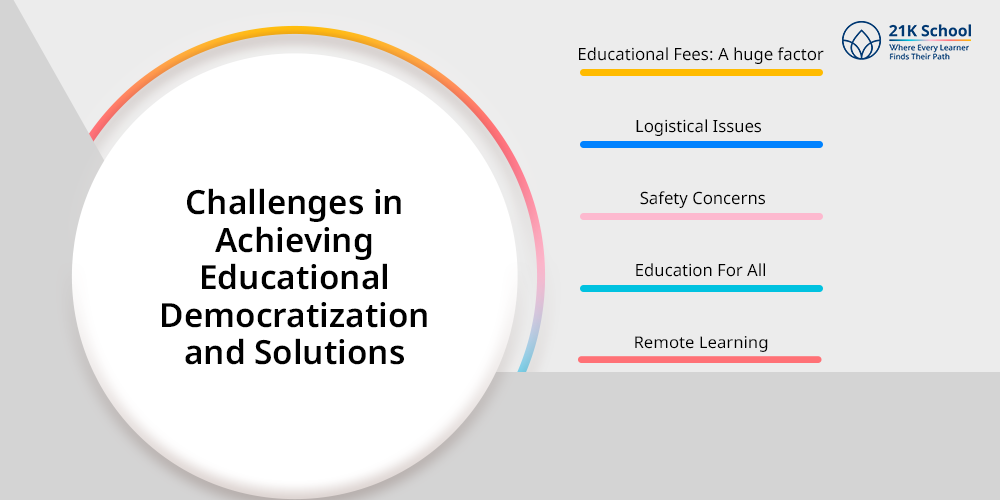
Achieving educational democratization is very much essential in promoting better and equal outcomes.
To overcome the barriers of educational democratization such as unequal access, outdated curriculums, and lack of inadequate teachers.
Democratization can be empowered through inclusive policies, proper infrastructure and modern teaching methods. Below you can check the challenges and solutions of educational democratization.
1. Educational Fees: A huge factor
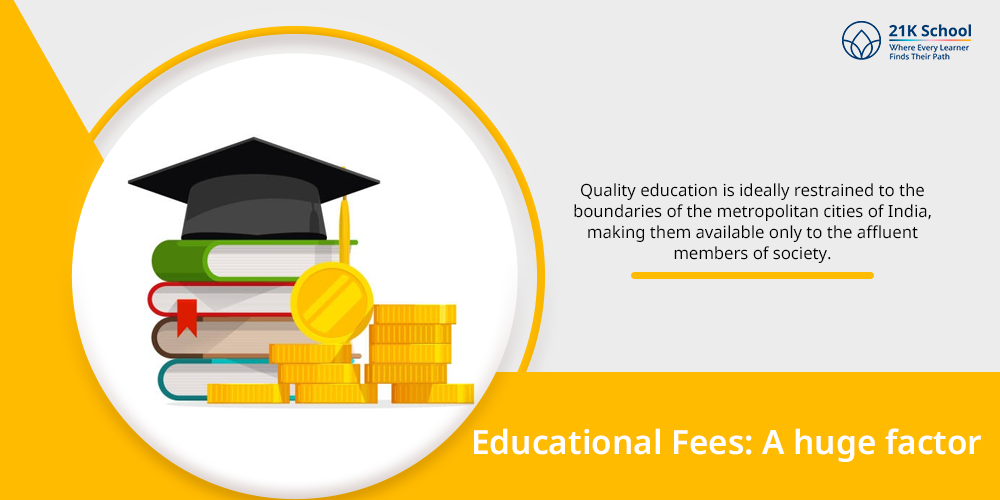
Quality education is ideally restrained to the boundaries of the metropolitan cities of India, making them available only to the affluent members of society.
Middle-class parents have to contend with substandard schools due to the lack of finance.
It is saddening to note that a child fails to get a good quality education simply because parents cannot bear the expenses.
This led to the creation of 21K School, where we provide your child with the best online school education at a fraction of the cost that you would have otherwise invested in a traditional school system.
2. Logistical Issues
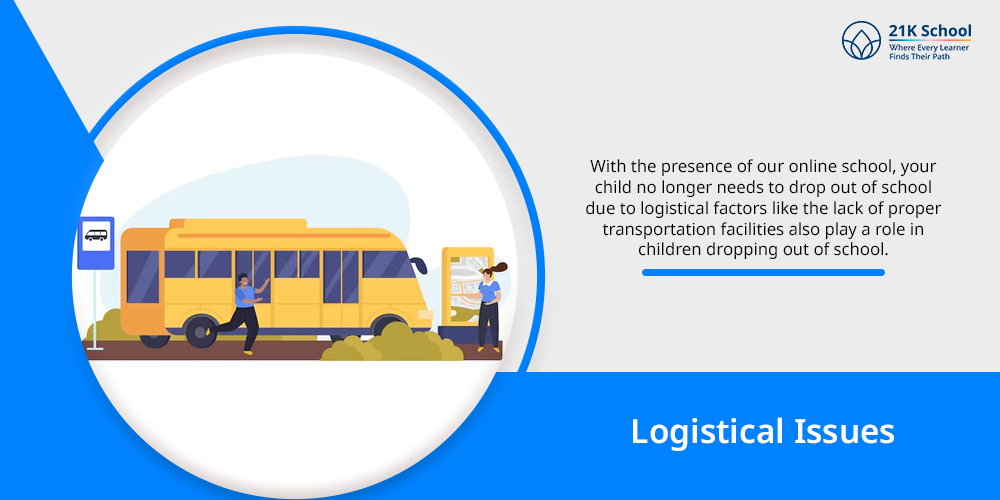
With the presence of our online school, your child no longer needs to drop out of school due to logistical factors like the lack of proper transportation facilities also play a role in children dropping out of school.
Enrol your child to avail of online school education at 21K School eradicates these difficulties. They can avail quality education at their fingertips!
This further means that they can compete with the best students worldwide and experience a high level of learning.
3. Safety Concerns

As a parent, worrying about your child’s safety is a given. It is also one factor that makes parents hesitant to send their child to a physical school, especially now with the existence of the pandemic.
But with 21K School, your child can easily receive education within the comfort of their home, putting your worries as a parent to rest. Your child can reap the benefit of online school education from the four walls of their home.
4. Education For All
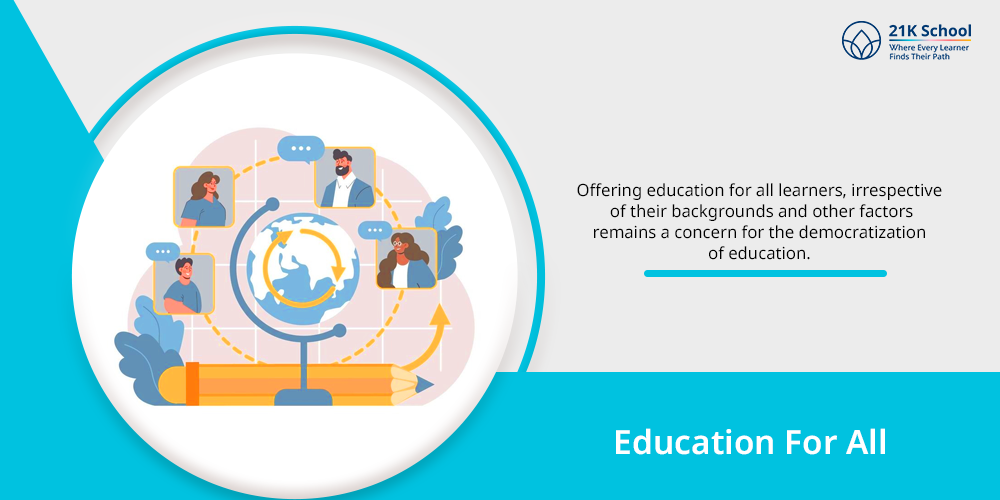
21K School was conceptualised with the belief that no child should be deprived of quality education. We have also designed our syllabus so that your child will find learning a pure joy.
Moreover, we have a separate dashboard for every child where children are provided with different badges according to their performance and extracurricular activities.
This acts as a motivating factor for the child and encourages him to achieve more.
We have ensured to create an environment that gives every child the scope to freely express their doubts and interact with the teacher one on one.
Such an environment provides them with the stimuli to research further and get a grip on the subject at hand.
5. Remote Learning
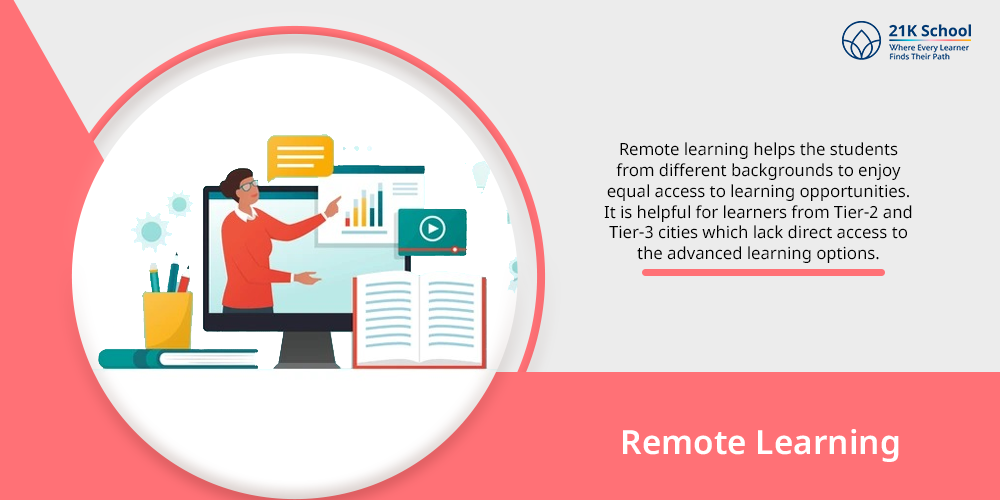
21K School is an online school education for your child designed to be accessed from any part of the globe. Every class is recorded and so students can always refer to a recorded live class in situations when they miss the actual class.
We emphasised and created an online-only school because we realised that there is a dearth of quality teachers for students in the non-metro areas.
This means that students in the Tier-2 and Tier-3 cities are exempted from receiving quality education all their lives.
Strategies to Promote Democratization of Education
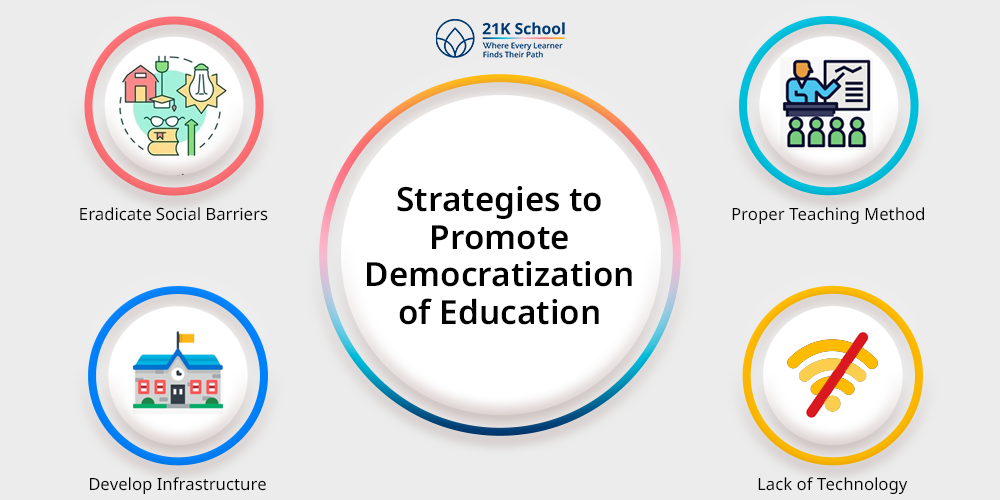
Democratization of education is very much essential in promoting holistic development among students.
Democratization of education can be achieved through inclusive policies, proper infrastructure, digital platforms, and so on. Below you can check how to promote democratization of education.
- Eradicate Social Barriers: Students who are from backwards classes find it tough to get an equal education. A lack of resources, poor infrastructure, and high school fees prevent students from low-income families from getting high-quality education.
However, this problem can be overcome by promoting inclusive education. In inclusive education students from diverse backgrounds can equally access quality education. - Proper Teaching Method: One of the causes of educational democratization is the lack of teaching methods. As more focus was laid on traditional learning methods instead of practical exposure, due to this students find it difficult to understand the concepts more easily which hindered the process of democratization of education, but this problem can be overcome by implementing practical learning methods.
- Develop Infrastructure: One of the major impacts of the democratization of education is poor infrastructure that contains a lack of proper resources, sanitisation, a safe environment and other issues.
Due to this many students find it difficult to understand the concepts precisely. This circumstance can be overcome by implementing new educational systems and proper resources. - Lack of Technology: Technology is a game changer in education, but various students find a lack of proper technology and technical terminologies. Due to this, they find it difficult to complete their education.
This situation can be overcome by implementing proper technology in education as well as using digital platforms and gamification methods.
Conclusion
No child should be deprived of good quality education as it is a fundamental right of every citizen of our country. Education is a basic right, and a child’s holistic development is our ultimate motto.
Therefore, providing education to every stratum of society is our main focus area. Excited to learn more about our online school education? Check our website to know more!
